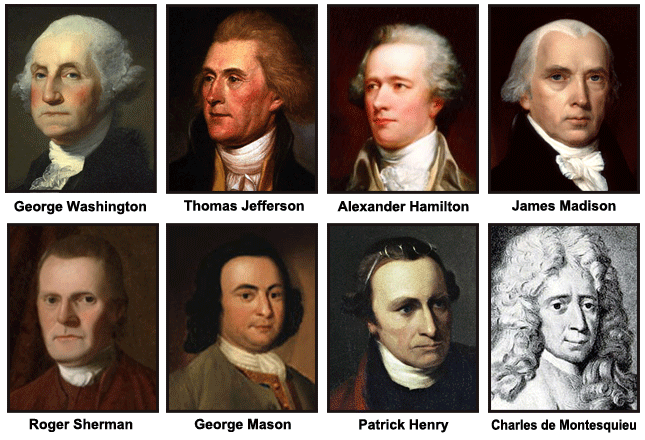

Washington was the unanimous choice to preside over the Constitutional Convention. In that role, he did not think it proper to express an opinion unless it was absolutely necessary, especially because he (and everyone at the convention) knew that he would be chosen to lead whatever government the assembly chose.
During the Constitutional Convention, Jefferson was in Paris serving as the U.S. Ambassador to France. As a confidant of Madison, Jefferson offered him some advice and ultimately supported the ratification of the Constitution. However, he shared the Anti-Federalist concerns over the power of the federal government and the lack of a bill of rights.
Hamilton was a delegate from New York at the Constitutional Convention. During the actual convention, he was a relatively minor figure. He delivered a long address calling for a strong federal government led by an elected monarch. One delegate remarked that this speech was "admired by everyone and supported by no one." Despite that failure he co-authored the Federalist Papers with James Madison and John Jay, during the fight for ratification.
James Madison is considered the "Father of the Constitution." His Virginia Plan served as the major template for the final document, and his political genius helped with its ratification. He drafted the Bill of Rights, which was the major demand of the Anti-Federalists. Madison also wrote the bulk of the Federalist Papers, still considered to be among the finest commentaries on the Constitution ever written.
A delegate from Connecticut, Sherman was influential in convincing representatives of large states and small states to accept his compromise plan for the structure of Congress, known as the Great Compromise. It was the breakthrough in creating a Constitution that almost everyone could accept.
During the Constitutional Convention, Mason was one of the most active delegates in shaping the document. He stunned the convention when he voted against it and became a leading Anti-Federalist, insisting on a bill of rights. Mason proposed 20 amendments to the Constitution that became Madison's template for the final ten. His strong influence has made him the "Father of the Bill of Rights."
Patrick Henry was a major opponent of the U.S. Constitution and a leading Anti-Federalist. He was deeply suspicious of the reasons for the Constitutional Convention and declined to attend it. Afterwards, he was instrumental in pushing for a bill of rights to be added to the document.
Montesquieu was an 18th century French philosopher whose book, The Spirit of Laws was a major source of inspiration for the structure of the Constitution. He explains the necessity for government to have separation of powers with checks and balances.